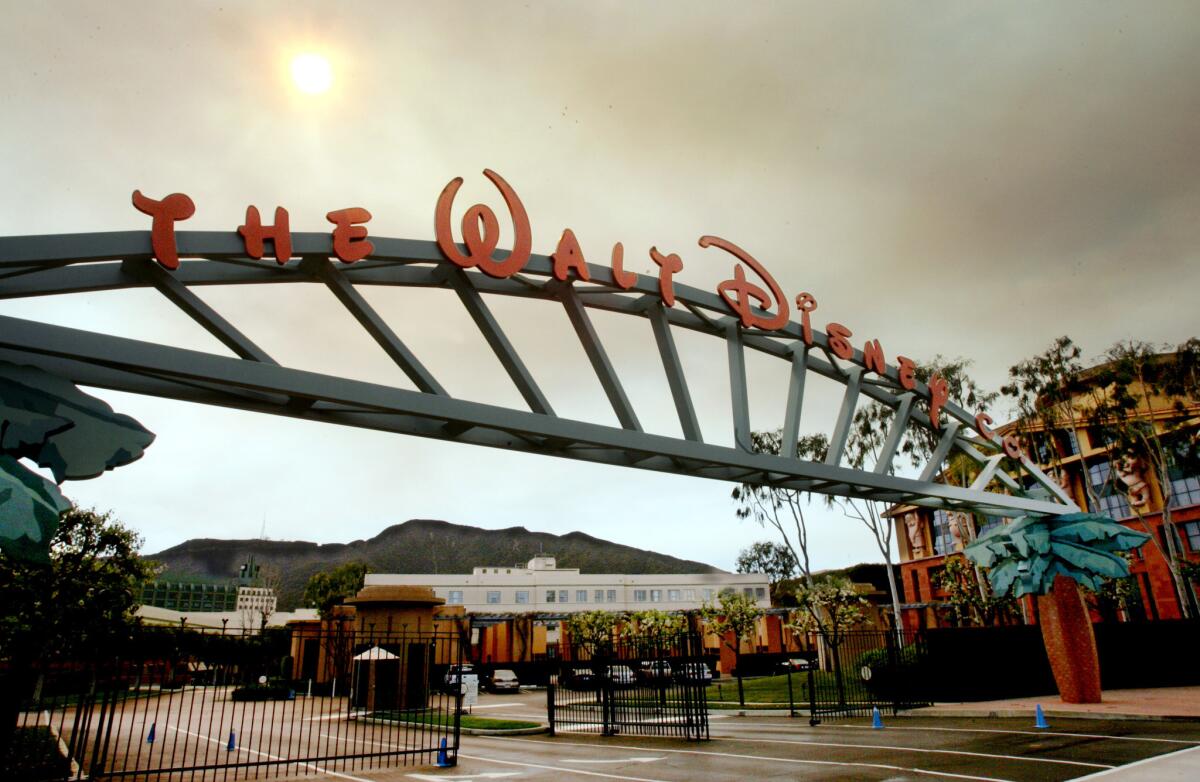With Disney+ in the spotlight, Disney revamps its business around streaming

- Share via
Emboldened by the success of Disney+, Walt Disney Co. is reorganizing its massive entertainment and media operations to focus on creating content for its streaming services in a major effort to accelerate its direct-to-consumer strategy, the company said Monday.
Under the new corporate structure, Disney’s media and entertainment units will be organized into content businesses that produce movies, TV shows and sports programming alongside an equally important, newly created group to distribute that content through traditional channels and its streaming services: Disney+, Hulu and ESPN+.
Separating distribution from content production will allow Disney to be more nimble when deciding how and where to release films and series, Disney Chief Executive Bob Chapek said in an interview. The new system, he noted, will allow creative executives to focus on what they do best — making movies and TV shows — and let others at the company worry about how the content goes out into the world.
“We want to let the creatives be creatives, and let the business people be business people,” Chapek said.
“This is a further evolution of what we’ve already done. Given our success so far, we want to further accelerate our transition to a direct-to-consumer-first model.”
Disney’s decision to solidify its focus on digital comes as its biggest rivals also make dramatic corporate changes. AT&T-owned WarnerMedia is in the midst of its own reorganization, which is expected to result in significant job cuts as the company adapts to economic pressures from the COVID-19 pandemic. Comcast Corp.’s NBCUniversal has also embarked on a reorganization as it shifts focus from traditional TV to streaming.
Burbank-based Disney had already charted a bold plan to turn toward streaming in an effort to remain a dominant force in entertainment amid the rise of Netflix and other digital entertainment options.
Disney+, which launched last November, has exceeded 60 million global subscribers, far exceeding analysts’ and executives’ expectations. Disney had previously set its five-year guidance at 60 million to 90 million subscribers, meaning the app is growing ahead of schedule, thanks to shows such as “The Mandalorian” and movies including “Hamilton” — which before the pandemic shut down cinemas was slated for a 2021 theatrical release.
Ahead of the Disney+ launch, the company’s then-chief executive, Bob Iger, described his direct-to-consumer strategy as Disney’s No. 1 priority. Chapek took over the CEO role in February; Iger is now executive chairman.
Disney said it would hold an investor day Dec. 10 to update shareholders on its direct-to-consumer plans. The company recently said it would build a general entertainment streaming service — separate from Disney+ — for countries outside the U.S., with content from units including ABC, FX and 20th Century Television.
Chapek said that the reorganization could result in some “efficiencies,” leading to job losses. However, the aim of the move is strategic and not driven by cost-cutting, he said.
“This is not about anything but setting the tone for the future,” Chapek said.
The restructured Disney will have three distinct content arms, run by the company’s current top executives.
Walt Disney Studios co-chairs Alan Horn and Alan Bergman are in charge of “studios content,” which will produce movies and shows based on popular franchises from brands including Walt Disney Animation Studios, Pixar Animation Studios, Marvel Studios, Lucasfilm, 20th Century Studios and Searchlight Pictures.
TV head Peter Rice is now chairman of general entertainment content, composed of TV studios including ABC Signature, 20th Television, ABC News, Disney Channels, Freeform, FX and National Geographic.
ESPN President James Pitaro is now chairman of ESPN and sports content.
In a major promotion, Disney elevated Kareem Daniel to lead the new media and entertainment distribution group, which includes streaming channels such as Disney+. The unit will manage the operations and Disney’s streaming services, as well as its domestic TV networks.
Investor Daniel Loeb of hedge fund Third Point wrote in a letter to Disney’s chief executive that the company should cancel its annual dividend and redirect the money to make more Disney+ content.
Daniel, who previously ran the company’s consumer products business, is a 14-year Disney corporate veteran. He has helped manage a number of Disney’s businesses, including consumer products, games and interactive experiences, publishing, studio distribution and the creative group, Walt Disney Imagineering.
The reorganization comes as Disney has been struggling to overcome the economic challenges of the COVID-19 pandemic and looking to cut expenses. The company recently said it would lay off 28,000 workers from its parks, experiences and products division, largely because of the continued closure of Disneyland Resort in Anaheim.
Disney has been operating Walt Disney World in Florida with limited capacity since July, but officials in California have refused to allow theme parks to open their doors, to the frustration of executives at Disney and other operators.
Chapek said government officials should give Disney credit for showing it can safely run Disney World and the so-called NBA bubble, also in Florida. The success of the NBA season, in which the Los Angeles Lakers won the championship series Sunday, is “proof positive that we know what we’re doing,” he said. “I don’t know how many data points we need to point to.”
Disney’s movie studio has been severely hobbled by theater closures in major markets including Los Angeles and New York. The studio last week said it would send Pixar’s latest animated picture “Soul” directly to Disney+ in late December in lieu of a traditional theatrical release.
More to Read
Inside the business of entertainment
The Wide Shot brings you news, analysis and insights on everything from streaming wars to production — and what it all means for the future.
You may occasionally receive promotional content from the Los Angeles Times.











